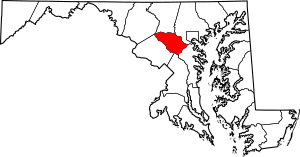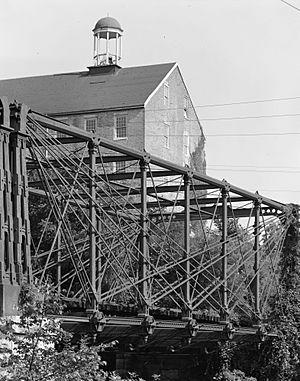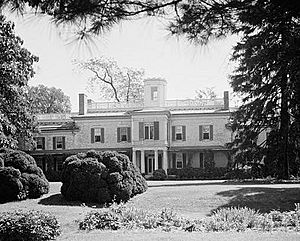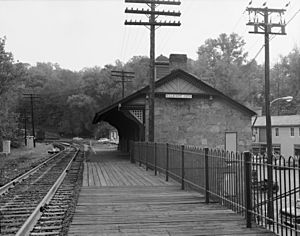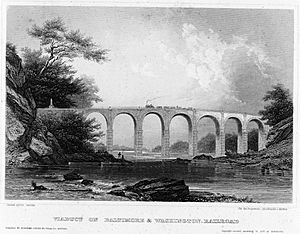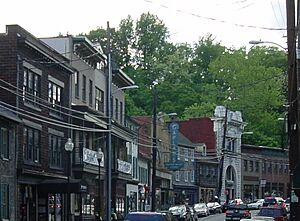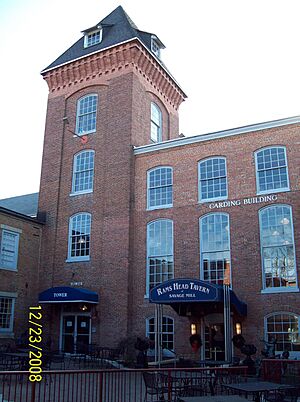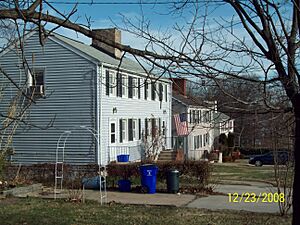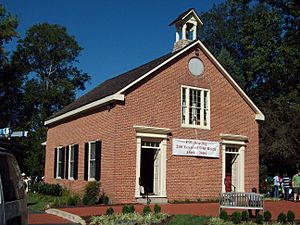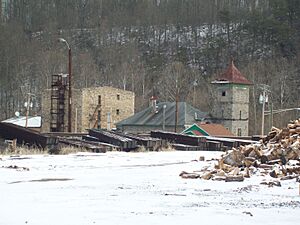National Register of Historic Places listings in Howard County, Maryland facts for kids
Howard County, Maryland, is home to many amazing places that are listed on the National Register of Historic Places. This special list includes buildings, sites, and objects that are important to the history of the United States. Think of it like a hall of fame for historic spots! These places are protected and celebrated because they tell us stories about the past.
In Howard County, there are 43 different properties and areas on this list. Four of these are even more special; they are called National Historic Landmarks. This means they are super important to the history of the entire country! Let's explore some of these cool historic places.
Contents
Famous Historic Places in Howard County
Bollman Truss Railroad Bridge
The Bollman Truss Railroad Bridge is a very old and special bridge. It was built in 1869 and is one of the first bridges in the United States to be made mostly of iron. It uses a unique design called a "Bollman truss," which was invented by Wendel Bollman. This bridge helped trains cross the Little Patuxent River near Savage, Maryland. It's a great example of early American engineering and how people built strong bridges for trains a long time ago.
Doughoregan Manor
Doughoregan Manor is a huge and historic house located west of Ellicott City. It was built in the early 1700s and is one of the oldest homes in Maryland that is still owned by the same family. The house was once the home of Charles Carroll of Carrollton, who was the only Catholic signer of the Declaration of Independence. This manor is a fantastic example of colonial architecture and shows us how important families lived hundreds of years ago. It's a true piece of American history.
Ellicott City Station
The Ellicott City Station is a very important building for train history. It was built in 1830 and was the first train station in the United States! This station was part of the Baltimore & Ohio Railroad, which was one of the earliest railroads in the country. It helped transport goods and people between Baltimore and Ellicott City. Today, it's a museum where you can learn all about early trains and how they changed transportation.
Thomas Viaduct
The Thomas Viaduct is another amazing railroad bridge. It was built between 1833 and 1835 and is one of the oldest multi-arch stone railroad bridges in the world that is still being used! This giant bridge crosses the Patapsco River and was also part of the Baltimore & Ohio Railroad. It's named after Philip E. Thomas, who was the first president of the railroad. The viaduct is a stunning example of how strong and long-lasting old engineering can be.
Ellicott City Historic District
The Ellicott City Historic District is a whole area in Ellicott City that is filled with historic buildings. This town was founded in 1772 by the Ellicott brothers, who built mills and homes along the Patapsco River. Many of the old stone buildings are still standing today. Walking through this district feels like stepping back in time. You can see old shops, homes, and churches that tell the story of how this important mill town grew.
Savage Mill Historic District
The Savage Mill Historic District includes the old Savage Mill and the homes where its workers lived. Savage Mill was a large textile factory that started operating in the early 1800s. It made cotton duck fabric, which was used for sails and tents. The mill was a big part of the town of Savage. Today, the old mill buildings have been repurposed into shops, restaurants, and art studios, but they still show their rich history.
Christ Church Guilford
Christ Church Guilford is a beautiful old church located north of Guilford. It was built in 1809 and has been a place of worship for over 200 years. The church has a simple, classic design and is surrounded by a historic graveyard. It's a peaceful spot that reminds us of the early communities in Howard County and their faith.
Daniels Mill
Daniels Mill is the remains of an old mill town along the Patapsco River. The mill itself was built in the 1840s and was used for making textiles. The town of Daniels grew up around the mill, with homes for the workers. While much of the town is no longer standing, the ruins and the natural beauty of the area tell a story of a busy industrial past. It's a reminder of how rivers powered early factories.
Images for kids


